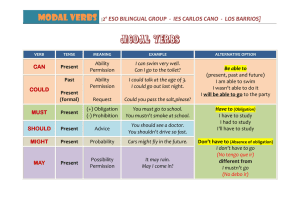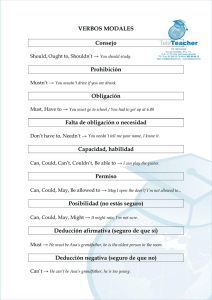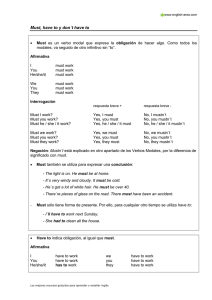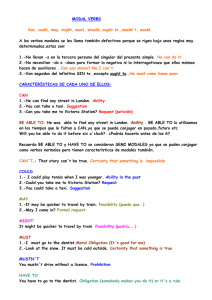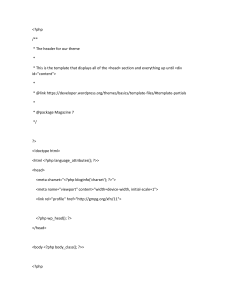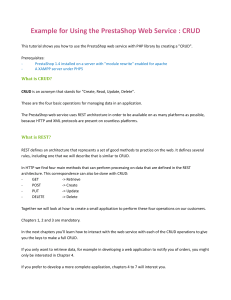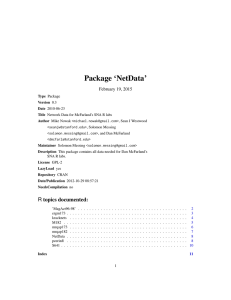6EP English Spanish
Anuncio
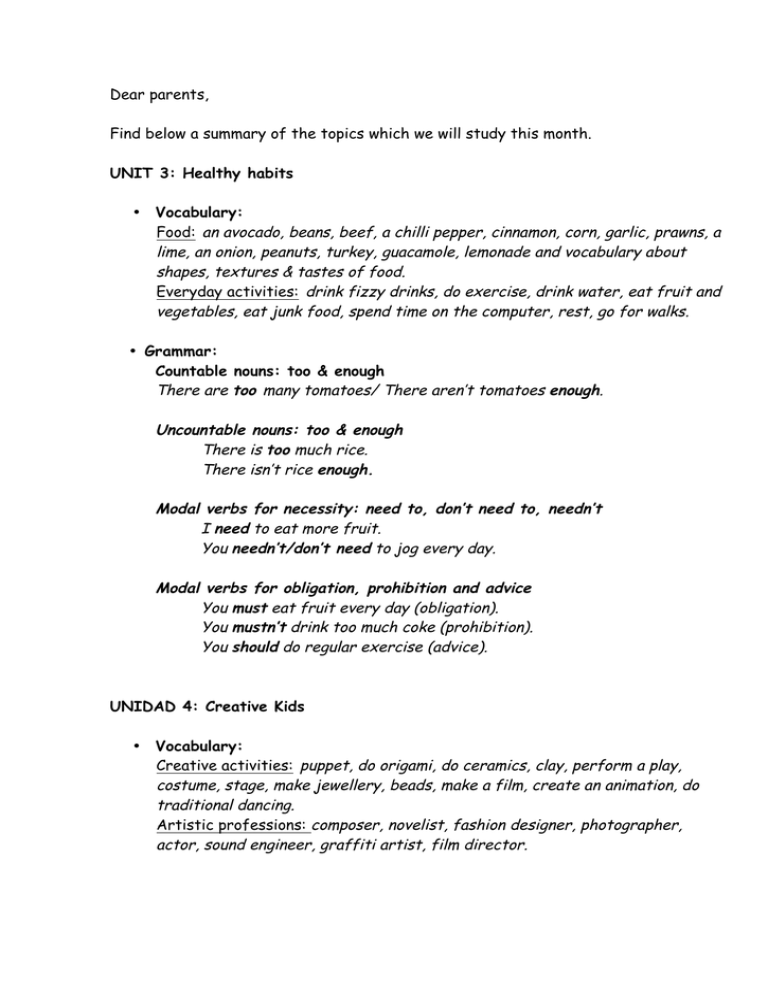
Dear parents, Find below a summary of the topics which we will study this month. UNIT 3: Healthy habits • Vocabulary: Food: an avocado, beans, beef, a chilli pepper, cinnamon, corn, garlic, prawns, a lime, an onion, peanuts, turkey, guacamole, lemonade and vocabulary about shapes, textures & tastes of food. Everyday activities: drink fizzy drinks, do exercise, drink water, eat fruit and vegetables, eat junk food, spend time on the computer, rest, go for walks. • Grammar: Countable nouns: too & enough There are too many tomatoes/ There aren’t tomatoes enough. Uncountable nouns: too & enough There is too much rice. There isn’t rice enough. Modal verbs for necessity: need to, don’t need to, needn’t I need to eat more fruit. You needn’t/don’t need to jog every day. Modal verbs for obligation, prohibition and advice You must eat fruit every day (obligation). You mustn’t drink too much coke (prohibition). You should do regular exercise (advice). UNIDAD 4: Creative Kids • Vocabulary: Creative activities: puppet, do origami, do ceramics, clay, perform a play, costume, stage, make jewellery, beads, make a film, create an animation, do traditional dancing. Artistic professions: composer, novelist, fashion designer, photographer, actor, sound engineer, graffiti artist, film director. • Grammar: 1) Past passive Leonardo da Vinci painted The Mona Lisa The Mona Lisa was painted by Leonardo da Vinci. 2) Infinitive/ Past simple / Past Participle -Regular verbs: play - played - played -Irregular verbs: ride - rode - ridden 3) Past passive questions Who was the book written by? / Who were the songs sung by? • Writing: Tips for learning how to write comic strips (improve the use of some writing skills like full stops, exclamation marks or question marks). • Speaking and Conversation: Tips for learning how to talk about a picture and useful vocabulary for descriptions: at the top, in the background, on the left, etc. • Pronunciation: Exercises for identifying silent “w” in words. At home You can help your children learn the vocabulary by working on some/all of these activities: • Ask them to talk about food using too/enough with countable/uncountable nouns. • Ask them to mention some obligations, prohibitions or advice they have at school (using the next modal verbs: must/ mustn’t/ should). • Ask them about obligations, prohibitions or recommendations they can find in several public spaces, using the next modal verbs: need to/ must/ mustn’t/ should. • Talk to them about they favourite meals, receipes they have in their families, typical dishes from a country, etc. • Hold a conversation with them about any creative activity or artistic profession they would like to develop. • Talk about any kind of topic with them using the past passive voice. INCREASING KNOWLEDGE Apart from this, it’s always highly recommended to watch TV series or films in their original versions (with subtitles). MacMillan book codes are also a great option for reviewing all the contents; there you can find many useful songs, activities, grammar explanations, etc. You may also find great ideas for activities and materials on the following websites: http://www.englishpage.com/minitutorials/countable-uncountable-nouns.htm http://www.myenglishpages.com/site_php_files/grammar-lesson-too-enough.php http://www.myenglishpages.com/site_php_files/grammar-exercise-too-enough.php http://www.ejerciciodeingles.com/ejercicios-distinguir-too-much-too-many-enough/ http://www.usingenglish.com/quizzes/108.html http://www.tolearnenglish.com/exercises/exercise-english-2/exercise-english-99390.php http://www.englisch-hilfen.de/en/exercises/modals/must_not_need_not.htm http://www.englishexercises.org/makeagame/viewgame.asp?id=2786 https://www.youtube.com/watch?v=zodGXBfvYKs https://www.ego4u.com/en/cram-up/grammar/passive/exercises?simple-past http://www.englisch-hilfen.de/en/exercises/active_passive/sentences_simple_past.htm http://www.grammarbank.com/simple-past-passive.html Estimados padres, A continuación pueden encontrar un sumario de los contenidos que estudiaremos durante este mes., UNIDAD 3: Healthy habits • Vocabulario: Food: an avocado, beans, beef, a chilli pepper, cinnamon, corn, garlic, prawns, a lime, an onion, peanuts, turkey, guacamole, lemonade and vocabulary about shapes, textures & tastes of food. Everyday activities: drink fizzy drinks, do exercise, drink water, eat fruit and vegetables, eat junk food, spend time on the computer, rest, go for walks. • Gramática: Sustantivos contables: too & enough There are too many tomatoes/ There aren’t tomatoes enough. Sustantivos incontables: too & enough There is too much rice. There isn’t rice enough. Verbos modales para “necesidades”: need to, don’t need to, needn’t I need to eat more fruit. You needn’t/don’t need to jog every day. Verbos modales para “obligaciones, prohibiciones y consejos” You must eat fruit every day (obligation). You mustn’t drink too much coke (prohibition). You should do regular exercise (advice). UNIDAD 4: Creative Kids • Vocabulario: Actividades creativas: puppet, do origami, do ceramics, clay, perform a play, costume, stage, make jewellery, beads, make a film, create an animation, do traditional dancing. Profesiones artísticas: composer, novelist, fashion designer, photographer, actor, sound engineer, graffiti artist, film director. • Gramática: 2) Past passive Leonardo da Vinci painted The Mona Lisa The Mona Lisa was painted by Leonardo da Vinci. 2) Infinitive/ Past simple / Past Participle -Regular verbs: play - played - played -Irregular verbs: ride - rode - ridden 4) Past passive questions Who was the book written by? / Who were the songs sung by? En casa Pueden ayudar al niño/niña a aprender lo estudiado en clase a través de las siguientes actividades: • Pedirles que hablen de comida utilizando “too/enough” con sustantivos contables e incontables. • Preguntarle sobre algunas obligaciones, prohibiciones o consejos que tienen establecidos en su clase o escuela (utilizando los verbos modales: must/ mustn’t/ should). • Hablar con el niño/a a cerca de sus platos preferidos, recetas típicas de la familia, platos típicos de algún país, etc. • Mantener una conversación con ellos/as sobre qué profesión o actividades artística les gustaría elegir si tuvieran la oportunidad. • Entablar cualquier tipo de conversación con el niño/la niña en la que se utilice la voz pasiva en pasado. AMPLIAR / REFORZAR CONOCIMIENTOS Aparte de esto, siempre es recomendable que las series o películas que vean los niños en casa sean en versión original (con subtítulos) para mejorar listening, vocabulario, estructuras, expresiones, etc. Los códigos del libro en MacMillan te permiten acceder a espacios web en los que el alumno/a puede encontrar todo tipo de material complementario para su estudio (gramática, actividades, canciones, etc). En los siguientes espacios web, también pueden encontrar algunas actividades, materiales y explicaciones gramaticales que son útiles para repasar y reforzar lo aprendido en clase: http://www.englishpage.com/minitutorials/countable-uncountable-nouns.htm http://www.myenglishpages.com/site_php_files/grammar-lesson-too-enough.php http://www.myenglishpages.com/site_php_files/grammar-exercise-too-enough.php http://www.ejerciciodeingles.com/ejercicios-distinguir-too-much-too-many-enough/ http://www.usingenglish.com/quizzes/108.html http://www.tolearnenglish.com/exercises/exercise-english-2/exercise-english-99390.php http://www.englisch-hilfen.de/en/exercises/modals/must_not_need_not.htm http://www.englishexercises.org/makeagame/viewgame.asp?id=2786 https://www.youtube.com/watch?v=zodGXBfvYKs https://www.ego4u.com/en/cram-up/grammar/passive/exercises?simple-past http://www.englisch-hilfen.de/en/exercises/active_passive/sentences_simple_past.htm http://www.grammarbank.com/simple-past-passive.html
